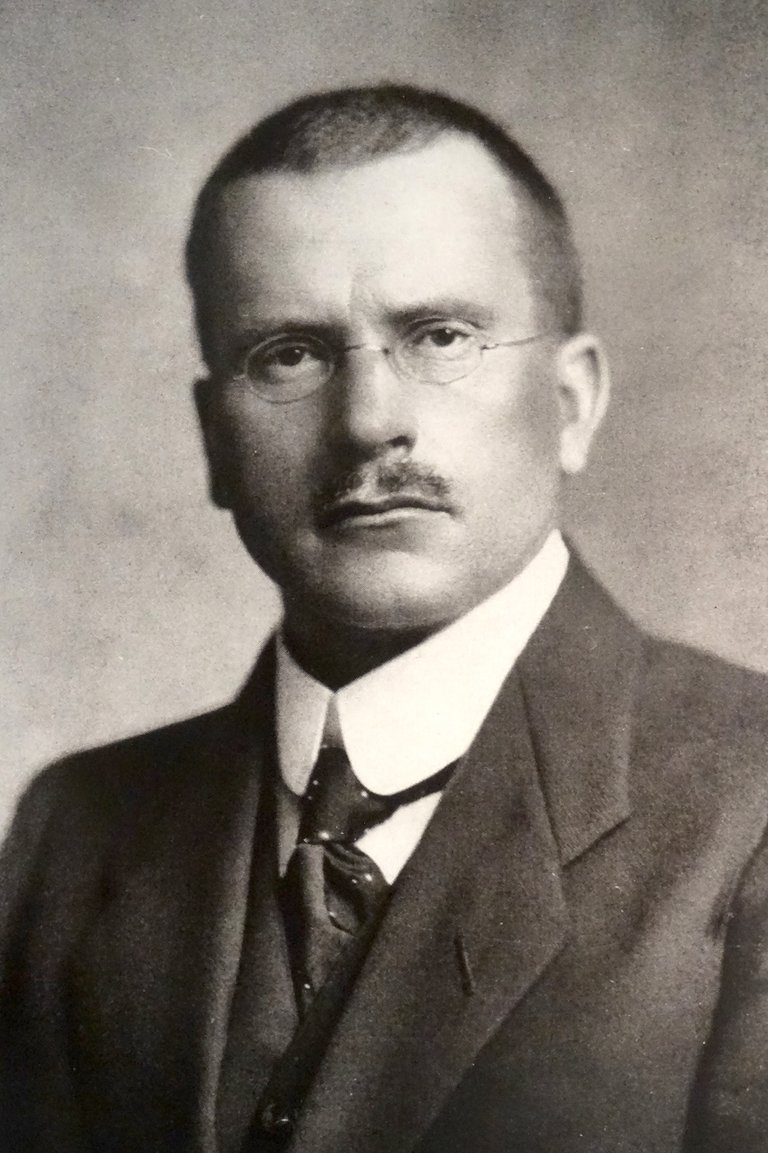CARL JUNG

source
From a scientific viewpoint, Jung’s theory contains some of the most elusive concepts to measure objectively, yet his theory of personality psychetypes has stimulated considerable empirical testing.
Like Freud, Carl Jung proposed a theory that gives a prominent role to the unconscious. For Jung, however, the libido was not primarily sexual but was a broad psychic energy with spiritual dimensions, and the most interesting personality devel- opments occur in adulthood, not in childhood.
He was concerned with future direc- tions toward which personality is developing, in contrast with Freud’s emphasis on the past. Jung allowed himself to experience the unconscious firsthand through dreams and fantasies, comparing his role to that of an explorer who was strong enough to make this dangerous voyage and come back to tell others what he found there.
Jung considered science an inadequate tool for knowing the psyche. He preferred the language of mythology. He rejected “rational, scientific language” in favor of “a dramatic, mythological way of thinking and speaking, because this is not only more expressive but also more exact than an abstract scientific terminology.
This antiscientific attitude places Jung outside mainstream psychology, where some dismiss Jung’s work as a “pseudoscience”.
Jung’s perspective strengthens the bridge Freud had begun between psychology and symbolic expressions in literature, art, and religion. Jung goes further than Freud, though, in abandoning scientific constraints. Even Freud, who referred to the Oedipus story and other myths in his theorizing, opposed Jung’s mysticism. Nonetheless, Jung’s theory has attracted many followers. Jungian psychotherapy and applications of his ideas in career guidance, organizational development, and literary criticism attest to his influence.
BIOGRAPHY
Carl Gustav Jung was born in Switzerland in 1875, the son of a Protestant minister and perhaps the great-grandson of the renowned German poet Goethe. Jung had one sister, who was 9 years his junior.
As a young psychiatrist, Jung lectured at the University of Zurich, developed a word association technique for uncovering the emotional complexes of his patients, and had a private practice.
He greeted Freud’s controversial work on psychoanalysis enthu- siastically and supported it in his own professional writing. After a period of mutually admiring correspondence, the two met at Freud’s office in Vienna. This first meeting lasted 13 hours, attesting to the breadth of their mutual interest and respect. They continued an active correspondence, which has been published. Together they traveled to the United States in 1909 to present psychoanalysis at the G. Stanley Hall Conference at Clark University. The trip, a long journey by sea, gave Jung and Freud plenty of time to discuss psychoanalysis and dreams. These discussions revealed a small crack in their relationship that later became a huge split.
Jung presided over a psychoanalytic association in Zurich, and Freud intended to have Jung succeed him as president of the International Psychoanalytic Association, thinking it would be advantageous to broaden psychoanalysis beyond its Jewish circle. He conveyed this intent to Jung in a letter in which he referred to Jung as a “crown prince,” and Jung responded with gratitude, referring to Freud as a father figure.
Before this could be achieved, however, the personal relationship between Freud and Jung was disrupted. There were intellectual disagreements, to be sure; Jung felt that Freud overemphasized the role of sexuality in his theory and underestimated the positive potential of the unconscious. However, it was a personal conflict as well part of a midlife crisis in which Jung withdrew from his academic pursuits and devoted himself to introspection and exploration of two personalities within his own psyche.
In later life, he continued subjective explorations of the unconscious, read esoteric texts on mysticism and alchemy, and built a primitive retreat at Bollingen, on Lake Zurich. He reported several personal experiences of psychic phenomena, which he understood as manifestations of a broad, transpersonal “collective unconscious.” For example, Jung is said to have dreamt of Winston Churchill whenever the English politician came near Switzerland, even though Jung had no conscious awareness of his arrival. Understanding the collective unconscious was Jung’s major life task.
OVERVIEW OF JUNGS’S THEORY
Individual Differences
Individuals differ in their tendency to be introverts or extraverts, which is stable throughout life. They also differ in the extent to which they make use of four psychological functions (thinking, feeling, sensation, and intuition).
Adaptation and Adjustment
The unconscious has an important role in healthy maturity and should be explored through symbolism. Health requires a balance between conscious and unconscious functioning.
Cognitive Processes
Rational thinking, intuition, and emphasis on concrete details all provide useful information and should be developed. Unconscious images influence perceptions and may distort our perception of reality.
Culture
Cultural myths and rituals provide ways of dealing with the unconscious. Important differences exist among cultures and should be preserved.
Biological Influences
Mental contents (a “collective unconscious”) as well as physical characteristics are inherited.
Development
Early experience was of little interest to Jung. Midlife change (individuation) involves exploration of the creative potentials of the unconscious.
IN A NUTSHELL
- Jung proposed a theory of personality in which the unconscious contains broad psychic energy, rather than simply sexual energy as Freud postulated.
- Consciousness and the unconscious exist in a relationship of compensation.
- During the individuation process of adulthood, unconscious aspects of personality are developed and integrated with those of consciousness in the development of a mature Self. In this process, the center of personality is shifted away from the ego.
- The persona is challenged by the emergence of the shadow and the anima or animus from the unconscious.
- Projection of the shadow contributes to racism. Projection of the anima or animus occurs in romantic love.
- The personal unconscious contains material repressed during individual experience.
- The collective unconscious contains transpersonal inherited material, including several archetypes that serve as patterns for experience.
- Jung encouraged people to encounter the unconscious through symbols in dreams, myths, religion, and cultural rituals. Modern myths, as well as ancient ones, are valuable and should continue to be developed by individuals leading a creative symbolic life.
Reference - Theories of Personality - Understanding Persons, Susan Cloninger, The Sage Colleges, 6th edition





I wonder if it is possible to overcome, or go beyond our stereotypical behaviour and be free in such a way that we are spontaneous and living in the moment?
I wonder too. I personally can not do it. I wish I found the secret. Did you?
Yes, a few times that lasted not long enough. It's not something I can command though...
I see. I feel free when I create art. In the creation process I forget about reality. That adrenaline rushing through my veins makes me feel so alive, so yes, I live the moment. Unfortunately it doesn’t last long enough, like you said.
Congratulations @starjewel! You have completed the following achievement on the Steem blockchain and have been rewarded with new badge(s) :
You can view your badges on your Steem Board and compare to others on the Steem Ranking
If you no longer want to receive notifications, reply to this comment with the word
STOPDo not miss the last post from @steemitboard:
Vote for @Steemitboard as a witness to get one more award and increased upvotes!
Hello, check my content, maybe u like.
https://partiko.app/@newscryptodays/upwallet-an-important-project-of-dacc-ecosystem-sqsrqvwu
Posted using Partiko Android
I find Jung my favourite psychologist with his emphasis on dreams. Thanks for the write up.